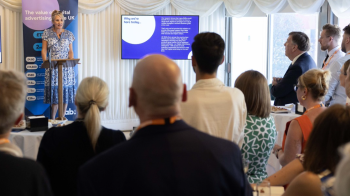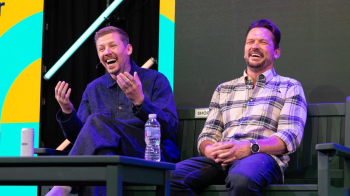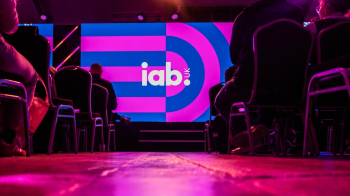An impressionist, a professor and a CEO at Ad Week Europe
Posted on Tuesday 01 February 2022 | IAB UK
For our session at Ad Week, Jon Mew was joined by a professor and an impressionist to demonstrate the power of voices. Here’s the write-up.
Flexing Your Voice at Ad Week Europe
Our vision at the IAB is to build a sustainable future for digital advertising. Part of this ambition is addressed by helping businesses prepare for the future. And one area where brands are increasingly looking for guidance is in the application and value of voice technology.
Recognising this need, we published our ‘Find Your Voice’ research towards the end of 2018, and this week we were invited by Ad Week Europe to explore some of the key themes within the report at their event.
To do so we invited one of the contributors, Professor of Cognitive Neuroscience at UCL, Dr Sophie Scott, and impressionist, actor, writer and musician, Duncan Wisbey to join our CEO, Jon Mew, in an exploration of both the technology and how we, as humans, interact and engage with speech and the sound of voices more broadly.
Within our session, we particularly wanted to highlight areas for consideration for brands when approaching this broad topic, presenting some of the insights so they could be taken away and used as inspiration and conversation starters (if you excuse the pun) when setting their strategy.
Jon introduced the session by seeking to define what constitutes voice technology. When asking how many people owned a voice assistant, roughly half the audience raised their hands. Jon then confessed this was a trick question, employed to emphasise his point, as almost all of us carry a voice assistant with us everywhere we go - inside our smartphones.
Jon’s point was that brands should not limit their thinking about voice to just smart speakers. These are not the only route into voice technology. He likened this narrow view to the five years he spent building and promoting mobile within the IAB and how, at first, the default brand objective was only to build an app.
This isn’t to denigrate the importance of Alexa skills, but just to highlight there is a broader range of opportunities available to explore, including Voice Apps, Ads, SEO, Products and Digital Services and Brand Partnerships. Indeed, if ComScore’s prediction that over half of all searches will be conducted by voice by the end of 2020, thinking about voice derived discoverability is going to be essential.
The second area for consideration is the idea of brand voice applications adopting the posture of a utopian personal butler.
Whilst this may sound like a lofty ambition - and clearly careful planning is required to determine what approach is going to work best - the point is that utility and the idea of adding value is even more acute than in any previous media channel. The recommendation here is to start with low complexity/high value ideas, so for example, if you’re a medicinal brand, maybe this means providing healthcare tips, whilst a cinema chain may provide updates on films beyond just their start times.
The Sounds of Science
Following Jon, Professor Sophie Scott gave a snappy summary of the equally snappily titled ‘Source Filter Theory of Mammalian Vocalisations, explaining how all land mammals use their breath, larynx and shape of their mouth to communicate. Humans, it transpires, are able to employ far more complex sounds and words, due to our upright posture and therefore reduced burden on our rib cages.
Sophie went on to reveal more about the primal signals we all receive and decode when we hear someone - or something - speak.
Beyond the obvious, language, sex, age, mood, geographical origin and socioeconomic status, we also pick up signals for affiliation, affection and even health. In a similar way to how a head cold manifests in your voice, or when you’re told to smile when on the phone to communicate a friendly demeanor, tests have shown that it is possible for humans to detect if someone has broken their leg, merely from the way their voice sounds.
My Name Is...
The session concluded with a whistle-stop, scarily accurate tour of celebrity impersonations from Duncan Wisbey.
It was at this point of the session I was reminded of the Martin Mull quote (often misattributed to Costello or Zappa), “writing about music is like dancing about architecture”.
How would it be possible to describe how Duncan took us through the jaw positions, mouth movements and pitch that could take us from Morgan Freeman to David Attenborough, Paul McCartney to Trump, or even Peter Snow through Cary Grant to Jools Holland. I guess you had to be there!
The session concluded with an audience Q&A, with a question raised about how brands should prepare their actual voice versus their competitors, for example a new entrant like Monzo compared to a legacy brand like Nationwide.
Sophie suggested you could either consider how this brand should sound, or how the audience who may buy this product would like to be spoken to. As Duncan pointed out, this doesn’t necessarily mean talking street, just because it is perceived to be a youth-orientated brand.
Asking a question of the audience, Sophie wondered who liked the sound of their own voice. Perhaps understandably, no-one really said yes. And this is the norm; most of us find it uncomfortable to hear a recording of ourselves speak.
However, she then revealed that research has shown that if we are played a range of voices and we are not aware that one of them is our own and we’re then asked which one we liked the best, the answer is almost always the recording of our own voice. Not sure what Narcissus would think of that.
The final question highlighted the perceived understanding that 90 percent of our behaviours and purchases are emotional, rather than rational, and then asked whether that would change with the rise of voice technology.
Sophie explained that it is really hard for humans to turn off the emotional aspects of our nature, no matter how hard we try. However our reaction is our reaction, it’s nothing to do with the speaker. We therefore have to work to try to leverage that understanding.
There are some voices that you instinctively dislike, however there are some you love. For example, Chris Rock sounds so delighted and full of energy, you feel certain he’s going to be funny. Most of this is purely vocal performance. So, despite the fact humans over-value rational thought, we can’t get rid of the emotion.
Duncan added that he is sometimes asked during castings to take the emotion out of a voice, but then demonstrated that if you actually do so, it sounds so flat it’s quite scary.
The session was over far too quickly, with Jon giving the last word to Duncan, in the style of his favourite voice. He opted for the mellow stylings of Macca once more. An amusing end to an entertaining discussion, which we hope provided some useful insight and levity for brands as they consider this important new frontier.
Written by
IAB UK
Related content
IAB UK manifesto for growth in digital advertising
Learn moreMood, mindset and meaning: how audio and culture shaped day two of IAB Upfronts
Learn moreFrom WhatsApp to fandom: How connection and creativity ruled IAB Upfronts day one
Learn moreLime bikes into September’s Joy of Digital Award with strike-day campaign
Learn more
Fast forward to 2030 with Futurescape
An in-depth exploration of the attitudes, innovations and media shifts that will shape the years ahead and redefine how we advertise by the turn of the decade



